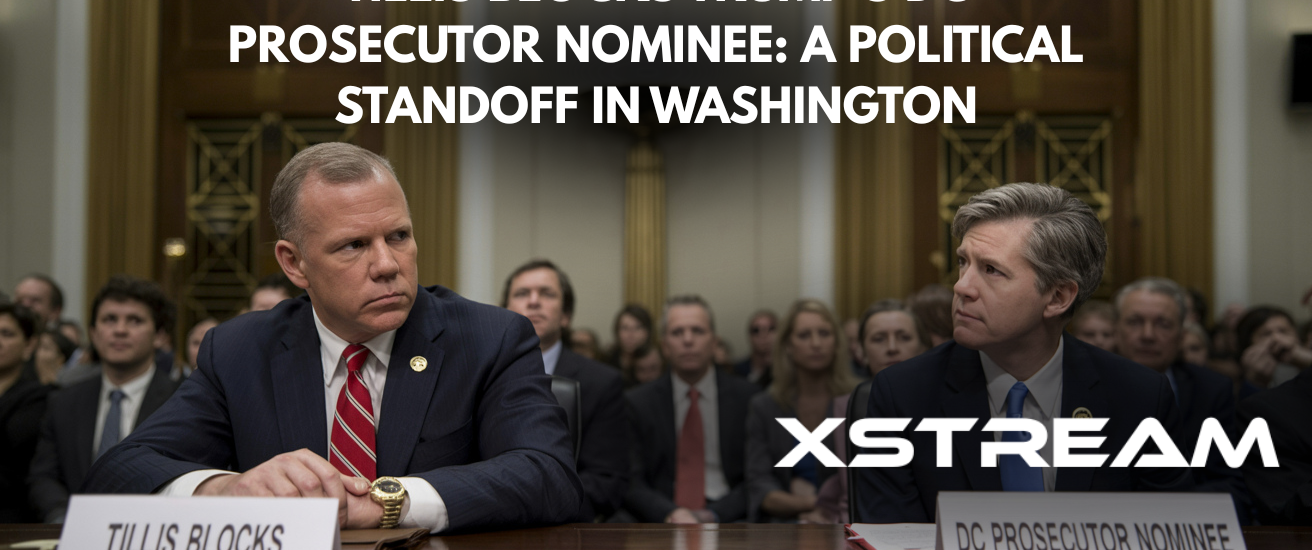In a surprising move, Senator Thom Tillis has blocked President Donald Trump’s nominee for U.S. Attorney for the District of Columbia, a position that plays a key role in federal prosecutions and legal oversight in the nation’s capital. The decision has set off a political firestorm, raising questions about the Senate’s role in judicial nominations and the ongoing partisan tensions in Washington, D.C.
Key Details of the Blocked Nomination:
✅ Who Was the Nominee?
President Trump’s nominee for the U.S. Attorney for D.C. position was Jessie Liu, a seasoned prosecutor with extensive experience in both the public and private sectors. Liu was highly regarded for her previous work as Deputy General Counsel at the U.S. Treasury Department and Chief of the Public Corruption and Civil Rights Section at the U.S. Attorney’s Office in Washington. Her nomination was expected to proceed smoothly given her background and qualifications.
✅ Reason for the Block
Senator Tillis, a Republican from North Carolina, decided to block Liu’s confirmation on the grounds of concerns over her handling of key issues related to investigations into President Trump’s associates. Tillis expressed reservations about Liu’s previous role in overseeing investigations that involved members of the Trump administration. While Liu was widely seen as qualified, Tillis raised questions about her impartiality and political independence, leading to the unprecedented move of blocking her nomination in the Senate.
✅ Political Implications
The decision to block Liu’s nomination comes amidst growing partisan divisions in Washington, with both sides fiercely contesting appointments to key judicial and law enforcement roles. Democrats have expressed concerns that such actions undermine the independence of the judiciary and could have long-term effects on the federal prosecution system. On the other hand, Republicans like Tillis argue that nominees need to be fully vetted to ensure their impartiality, particularly in high-stakes positions that could impact ongoing political investigations.

What This Means for President Trump and His Administration:
✅ A Setback for Trump’s Judicial Nominations
Blocking Liu’s confirmation is a rare setback for President Trump, who has made significant strides in reshaping the federal judiciary through the nomination of conservative judges and attorneys. This move by Tillis reflects the ongoing fractures within the Republican Party, with some members distancing themselves from Trump’s more controversial appointments. It remains unclear whether the President will be able to find a suitable replacement for Liu or if the block will set a precedent for future nominations.
✅ Impact on the U.S. Attorney’s Office
The U.S. Attorney for the District of Columbia plays a critical role in overseeing a wide range of federal cases, including corruption investigations and high-profile trials involving national security and political figures. With Liu’s nomination blocked, the vacant position could lead to delays or uncertainty in critical legal matters in D.C. The Justice Department may be forced to appoint an interim replacement or continue operating with limited leadership in the office.
What This Means for Congressional and Judicial Politics:
✅ Partisan Gridlock in Senate
The decision to block Liu’s confirmation highlights the partisan gridlock that has come to define much of the Trump administration’s time in office. Nominations for judicial and executive branch positions have been fiercely contested, with Republicans and Democrats regularly leveraging their Senate majority to advance or block key appointments. This move further deepens the divide over how much influence the President should have in shaping the federal judiciary and how much oversight the Senate should exert.
✅ Senator Tillis’ Position in the Party
By blocking Liu’s nomination, Senator Tillis has positioned himself as a key figure in the ongoing debate over judicial nominations, especially within the Republican Party. His actions suggest that he is willing to challenge Trump’s appointments if he feels they are politically motivated or could compromise the integrity of the justice system. This stance could bolster his reputation among certain voters but may also draw criticism from Trump supporters who view the move as a betrayal of party loyalty.
Looking Ahead:
As the fallout from this nomination block continues, all eyes will be on Congress to see how this decision influences future nominations and appointments. With the 2024 elections on the horizon, judicial nominations and the power of the Senate to block them will likely become a key point of contention. President Trump will need to navigate this political landscape carefully as he pushes forward with his remaining appointments.
At XStream Elite, we’ll continue to monitor the evolving situation regarding Trump’s judicial appointments, Senate decisions, and the broader political climate as it shapes the future of U.S. law enforcement and government.
📌 Stay updated with the latest political news and judicial insights at XStream Elite.
— XStream Elite: Where Politics Meets Power.





